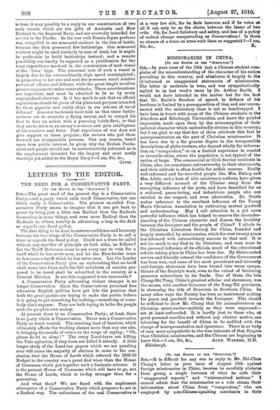MISSIONARIES IN CHINA.
[TO THE EDITOR 01 TEE " EirscriTox."]
Sns,—In your issue of the 18th inst. a Chinese student com- plains of the misunderstanding of the character of his nation prevailing in this country, and atteibutes it largely to the ill-informed or exaggerated statements of missionaries. The letter is moderate in tone, and was sympathetically replied to in last week's issue by Dr. Arthur Smith. I would not have intruded in the matter but for the fact that Dr. Smith's freedom of speech in defence of his brethren is limited by a presupposition of bias, and one uncon- nected with the missionary class is not so handicapped. I have been in touch with many of the Chinese students in the Aberdeen and Edinburgh Universities, and know the painful impression made upon them by the misconception of their national character which undoubtedly obtains in this country; but I am glad to say that few of them attribute this fact to misrepresentation on the part of Christian missionaries. It has been due in a far greater degree to the irresponsible descriptions of globe-trotters, who depend wholly for informa- tion on " comprasiors," or on a limited experience in coastal or riverside cities, where the population is not typical of the nation at large. The commercial or Civil Service residents in China, also, are sometimes untrustworthy in their statements, and their attitude is often hostile for selfish reasons. Really well-informed and far-travelled people like Mrs. Bishop and Mrs. Little, and a host of able missionary-authors, have given a very different account of the Chinese away from the corrupting influence of the ports, and have described for us a cultured, peace-loving, and industrious people who are entitled to our respect, and even admiration. Dr. Smith makes reference to the excellent influence of the Young Men's Christian Association in cultivating mutual goodwill and understanding. May I call attention to a yet more powerful influence which has helped to remove the misunder- standing of the Chinese character and disarm the hostility between the foreigner and the people of China P I allude to the Christian Literature Society for China, founded and largely controlled by missionaries, which for over twenty years has laboured with extraordinary success to that end. It is not too much to say that to its literature, and even more to the personal influence of its officials, much of the educational reform taking place in China has been due. By disinterested service and friendly counsel the confidence of the Government has been won, and some of the most prominent and intensely anti-foreign statesmen have been turned into warm sympa- thisers of the Society's work, even to the extent of becoming generous subscribers to its funds. One of these, the late Chang-Shi Tung, China's greatest scholar and statesman, was the means, with another Governor of the Yang-Tai provinces, in stemming the tide of Boxerism in Southern China. In many other ways the Society has been an instrument making for peace and goodwill towards the foreigner. This should be sufficient to show Mr. Chang that his animadversions on Christian missionaries—politely as they were expressed— are at least unfounded. It is hardly just to those who, at great personal sacrifice and without any ulterior motive, are labouring for the benefit of China to be saddled with the charge of misrepresentation and ignorance. There is no body of men more sympathetic to the true interests of that Empire than Christian missionaries, and the Chinese are beginning to






































 Previous page
Previous page